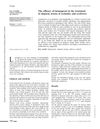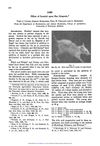 20 citations,
June 2019 in “Experimental Dermatology”
20 citations,
June 2019 in “Experimental Dermatology” The research suggests that autophagy-related genes might play a role in causing alopecia areata.
20 citations,
June 2019 in “Archives of dermatological research” Combining DPCP and anthralin helps regrow hair in some alopecia areata patients.
20 citations,
March 2019 in “Case Reports in Dermatology” IL-17 inhibitors for psoriasis may cause unexpected hair loss.
 20 citations,
March 2019 in “Journal of The European Academy of Dermatology and Venereology”
20 citations,
March 2019 in “Journal of The European Academy of Dermatology and Venereology” Minoxidil effectively and safely treats patchy hair loss, but more research needed.
20 citations,
January 2019 in “International journal of trichology” People with Alopecia areata often have lower Vitamin D levels, which might affect the severity of their condition.
 20 citations,
August 2018 in “Clinics in Dermatology”
20 citations,
August 2018 in “Clinics in Dermatology” The conclusion is that understanding and addressing the psychological effects of alopecia areata is important for effective treatment.
 20 citations,
January 2018 in “Expert opinion on emerging drugs”
20 citations,
January 2018 in “Expert opinion on emerging drugs” JAK inhibitors may soon be a safe and effective treatment for alopecia areata.
 20 citations,
December 2017 in “Journal of Investigative Dermatology Symposium Proceedings”
20 citations,
December 2017 in “Journal of Investigative Dermatology Symposium Proceedings” Researchers created a fast, accurate computer program to measure hair loss in alopecia areata patients.
20 citations,
November 2017 in “JAAD case reports” Ustekinumab significantly improved psoriasis, vitiligo, and alopecia areata in a patient.
 20 citations,
May 2016 in “Journal of Cosmetic Dermatology”
20 citations,
May 2016 in “Journal of Cosmetic Dermatology” Low vitamin D receptor levels found in hair loss patients; topical vitamin D treatment suggested.
20 citations,
April 2014 in “Autoimmunity” A specific gene variant (rs4833095) is linked to a higher risk of alopecia areata in Koreans.
 20 citations,
January 2013 in “Evidence-based complementary and alternative medicine”
20 citations,
January 2013 in “Evidence-based complementary and alternative medicine” TGPC plus CGT is effective and safe for treating severe alopecia areata in children.
 20 citations,
January 2012 in “International journal of trichology”
20 citations,
January 2012 in “International journal of trichology” Steroids are the best treatment for Alopecia Areata with few side effects.
 20 citations,
December 2010 in “JEADV. Journal of the European Academy of Dermatology and Venereology/Journal of the European Academy of Dermatology and Venereology”
20 citations,
December 2010 in “JEADV. Journal of the European Academy of Dermatology and Venereology/Journal of the European Academy of Dermatology and Venereology” Decreased CD200 in hair follicles may cause immune issues in some alopecia areata cases.
 20 citations,
June 2010 in “Genes and Immunity”
20 citations,
June 2010 in “Genes and Immunity” Blood tests can help understand the genetic differences in people with alopecia areata, including how severe it is and if it's inherited.
 20 citations,
November 2009 in “European Journal of Dermatology”
20 citations,
November 2009 in “European Journal of Dermatology” Latanoprost, a glaucoma treatment, was found ineffective in treating hair loss in eyebrows and eyelashes.
 20 citations,
January 2009 in “International Journal of Dermatology”
20 citations,
January 2009 in “International Journal of Dermatology” Hair loss in Clouston's syndrome improved with minoxidil and tretinoin treatment.
 20 citations,
July 2006 in “Veterinary dermatology”
20 citations,
July 2006 in “Veterinary dermatology” Melatonin helped some Pomeranian dogs regrow hair, but it wasn't linked to estrogen receptors.
 20 citations,
March 2006 in “Seminars in Cutaneous Medicine and Surgery”
20 citations,
March 2006 in “Seminars in Cutaneous Medicine and Surgery” Minoxidil and finasteride can help with hair loss, but more research is needed to improve treatments for certain types of hair loss.
 20 citations,
November 2005 in “Journal of Investigative Dermatology Symposium Proceedings”
20 citations,
November 2005 in “Journal of Investigative Dermatology Symposium Proceedings” IFN-γ and IL-2 are important for T cell activation in hair loss in mice.
 20 citations,
July 1990 in “Pediatrics in Review”
20 citations,
July 1990 in “Pediatrics in Review” The four main causes of hair loss in children are fungal infections, pulling out hair, autoimmune hair loss, and stress-related hair shedding.
 20 citations,
July 1990 in “Journal of the American Academy of Dermatology”
20 citations,
July 1990 in “Journal of the American Academy of Dermatology” Captopril may cause hair loss, as shown by a woman's hair regrowing after stopping the medication.
 20 citations,
March 1990 in “JAMA”
20 citations,
March 1990 in “JAMA” Topical eye β-blockers may cause hair loss.
20 citations,
June 1964 in “Archives of Dermatology” Systemic corticosteroids may effectively treat follicular mucinosis.
20 citations,
April 1959 in “A M A Archives of Dermatology” Alopecia mucinosa causes red, raised skin patches and hair loss.
 20 citations,
November 1943 in “Experimental Biology and Medicine”
20 citations,
November 1943 in “Experimental Biology and Medicine” Inositol helped prevent and cure hair loss in rats.
19 citations,
January 2021 in “Journal of the American Academy of Dermatology” Dupilumab may help children with alopecia areata and atopic dermatitis regrow hair.
19 citations,
July 2020 in “EBioMedicine” A gene variant increases the risk of a type of hair loss by affecting hair protein production.
 19 citations,
June 2020 in “International Journal of Dermatology”
19 citations,
June 2020 in “International Journal of Dermatology” Low-dose oral minoxidil effectively treats non-scarring hair loss with some side effects like hypertrichosis and postural hypotension.
19 citations,
August 2019 in “Dermatologic therapy” Janus kinase inhibitors show promise for treating alopecia areata but need more research for confirmation.




















